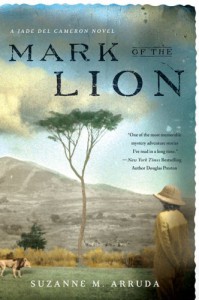Mark of the Lion
 If I could, I would rate the descriptions of East Africa at least 3 stars, all the rest a grudging 2 stars. I wanted so much to like both this book and this heroine, both of which should have been right up my alley, but they were steadfast in their refusal to give me the slightest hook of appreciation. The mystery was patently obvious and hamhandedly presented; the text tells us the heroine is smart and clever and then has her utterly oblivious to the easily-obtained answers to the mystery.
If I could, I would rate the descriptions of East Africa at least 3 stars, all the rest a grudging 2 stars. I wanted so much to like both this book and this heroine, both of which should have been right up my alley, but they were steadfast in their refusal to give me the slightest hook of appreciation. The mystery was patently obvious and hamhandedly presented; the text tells us the heroine is smart and clever and then has her utterly oblivious to the easily-obtained answers to the mystery. And, really, the heroine is at the root of most of the problems with this book. I can handle sketchy stock characters to flesh out a scene, but when your heroine seems to be mostly a compilation of Designated Personality Quirks (she hates tea and loves coffee, because it's less stuffy har har, we're going to tell you this at least twice in every scene where she might possibly consume a beverage!; she's anachronistically modern and egalitarian and independent, and god help us all, spunky) and a lot of telling entirely mismatched with the showing, it's hard to hang a novel on the strength ("strength") of that. This was also hurt by the imprecision of the POV, which was alternately deep in Jade's head then making descriptive, flattering commentary about her lithe figure, effortless style, and entrancing green eyes.
I just. I wanted to like her so much. Former ambulance driver in World War I! An adventuress striking off as a reporter on her own to fulfill a dying request! And instead she was this slapdash amalgamation of Cool Girl (she's too practical to be interested in all that lesser girly stuff; she has no truck with fashion and her own appearance but is effortlessly beautiful and attracts all the boys while being admired by all the other girls; did we mention she likes coffee and thinks tea is silly? also she's the best shot, the best mechanic, and the bravest hunter ever) with genuinely moving, well-written moments of PTSD flashback.
And let's not even get started with some of the race issues. Our independent (she's American, you see), anachronistic heroine thinks the way most of the Happy Valley set treat the local populace is kind of despicable (and she's right!), but the narrative hardly backs her up with her "and I will treat them better and no different from anyone else" prospect. The one character of color with any sort of significant onscreen presence and a personality beyond "mysterious, possibly wise, possibly crazy mystical person," is a little boy who just, like, stops showing up halfway through with scarcely a handwave, and the glaringly obvious MacGuffin has hardly any dialogue at all. (I can't really penalize them for being poorly sketched stock characters, because that's true across the board.) It's hard to believe in the heroine's protestations of equality when the author doesn't even come close.
All that, though, and I may still seek out the next book in hopes that the author gets better at writing people, because gosh her writing about landscape and animals was enjoyable.




